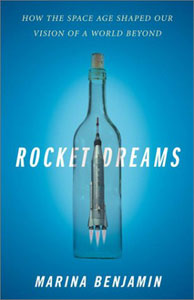|
|
Review: the aftermath of the Space Age
Monday, July 7, 2003
Rocket Dreams: How the Space Age Shaped Our Vision of a World Beyond
By Marina Benjamin
Free Press, 2003
Hardcover, 242 pp.
ISBN 0-7432-3343-3
US$24/C$38
Countless volumes have been written about the history of the Space Race: the competition between the United States and the Soviet Union to achieve any number of firsts in space, from Sputnik to Apollo 11. Many other books have focused on what has happened in space since then, from the space shuttle to the unmanned exploration of the solar system. Far fewer books, though, have explored the sociological effects of the fast start, and sharp post-Apollo decline, of the Space Age. Marina Benjamin provides such an examination in Rocket Dreams, offering a wide-ranging look at what happened to humanity’s dreams of exploring and settling the space frontier.
Benjamin, who as a child in the UK in the 1960s and 70s was fascinated by space exploration, starts her book at Cape Canaveral exploring the boom-and-bust cycle the area experienced as the space program ramped up in the early 1960s only to endure severe cutbacks within a decade. From there, she hopscotches across the continent taking in a series of seemingly unrelated events: meeting former astronauts at an autograph show in Los Angeles; attending a festival in Roswell, New Mexico to mark the anniversary of an alleged UFO crash; visiting the offices of SETI@home at UC Berkeley; and even venturing into an online community dubbed AlphaWorld. These vignettes gradually coalesce into the book’s central theme: that human exploration of space, once the overriding purpose of the Space Age, is gradually being supplanted by a more virtual—and more sustainable, in the author’s view—exploration, using robotic spacecraft and terrestrial telescopes that scan the skies, looking for evidence of life.
Benjamin does a fascinating job exploring the effects of space exploration from a sociological perspective. Her description of the autograph show, where people line up and talk quietly among themselves while waiting to meet Walt Cunningham, Dick Gordon, and Edgar Mitchell, seems dead-on: she described the atmosphere as one with all the seriousness of “a meeting of the Supreme Court”. She also draws intriguing links between events, such as associating the rise of the environmental movement in the late 60s and early 70s not only with the photos of the Earth from space, but also with the decline of the space program in general. Benjamin does overreach with some of these connections, though, as in the case of linking shopping malls with the concept of space colonies. Even if there was a burst of shopping mall development in the late 1970s and early 1980s, as Benjamin claims, it seems difficult to believe that their designs were in any way influenced by concepts of space colonies rather than by the simple economics of attracting a critical mass of stores to keep shoppers—and their wallets—inside for hours.
| Human exploration of space, the book argues, is gradually being supplanted by a more virtual and more sustainable exploration using robotic spacecraft and terrestrial telescopes. |
Benjamin concludes that space exploration is heading in a new direction, one that combines robotic planetary missions with SETI programs like Project Phoenix. The combination of the two, she suggests, offers us “the sense of connectedness (to one another and the cosmos) we once looked for in the Space Age.” In particular, she cites Project Phoenix and Mars Pathfinder, the mission that captured the imaginations of people worldwide six years ago, as “post-Space Age expressions of our continuing yearning to know what, or perhaps who, is out there.” In contrast, the frontier paradigm that shaped much of our thinking in the early Space Age—that space was the next frontier, indeed, the final frontier, to be conquered—has failed, in her opinion, because of the inability to follow up the pioneering expeditions of the 1960s with sustained commercialization. (Benjamin considers cyberspace to be a far more successful frontier than outer space, noting how the early work by academics has been followed up by rampant, untamed commercialization that the law is struggling to get a handle on.)
Hardcore space activists may have trouble accepting Benjamin’s thesis that the concept of space has a frontier has failed and is being replaced by one of space as a realm of virtual exploration. One can argue that her conclusion is premature: it may be too soon to write off commercialization of space, given the false start of the early Space Age and how those activities warped the expectations of the general public regarding space. Nonetheless, Rocket Dreams offers a compelling alternative view of the Space Age and how it affects our view, and our expectations, of space to this day.
|
|
